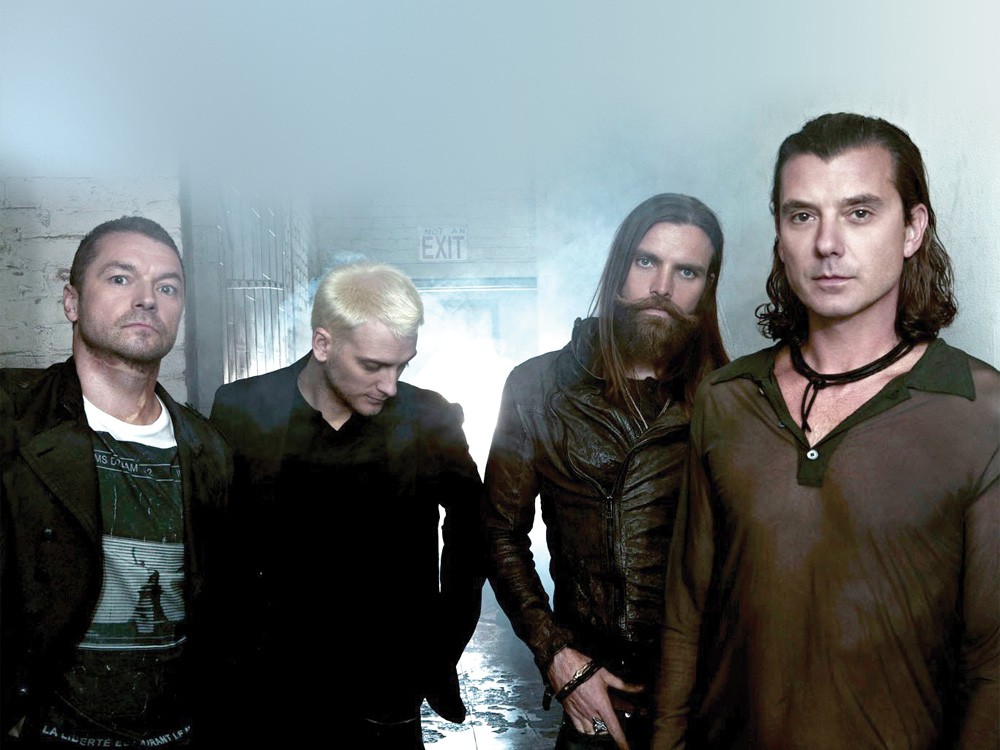Gavin Rossdale isn’t worried. He’s in the middle of a three-month world tour promoting the first album in a decade from his band, Bush, and he’s doing it without half the founding members of his band (who quit) or the support of a major label. It’s a recipe for disaster, unless you’re so famous that disaster can only tug at your heels but never trip you. Famous like Gavin Rossdale, in other words.
From 1992 to 2002, Bush was on fire. They dominated the alt-rock scene, churning out hits like “Glycerine” and “Everything Zen,” which drove every album into platinum status until the commercial flop of their fourth record, Golden State. After that, the band went their separate ways, with Rossdale remaining in the spotlight via a mediocre solo career, some acting credits, marriage to Gwen Stefani, and general sex-symbol status.
But despite keeping so busy, Rossdale has never achieved the artistic fame he had gained with Bush. So he began to bide his time, waiting until the perfect moment for a Bush comeback. He chose now.
Unfortunately, not everyone was along for the ride.
Type “gavinrossdale.com” into the navigation bar on your browser and you’ll be taken to the official Bush website. It’s a perfect illustration of the group’s reality — Gavin Rossdale is Bush. He’s the singer, the songwriter and the face of an empire, but the relationship goes both ways. Bush can exist without everyone except Rossdale, but without the name “Bush,” Rossdale’s music doesn’t have much of an existence.
“I’m playing a festival in St. Louis, and it just looks better that Bush is on rather than Gavin Rossdale, you know? I prefer it,” says Rossdale, who has openly described his solo career as “less powerful.”
But the rest of the band’s members don’t share Rossdale’s preferences. He says the main qualm was with guitarist Nigel Pulsford, who had made it clear he had no desire to tour anymore.
“I doubt anyone would actually leave the show because of it. If they did … I know that Nigel’s made solo records, they could always go buy a solo record,” says Rossdale. “I don’t know, I don’t think it’s that much of a problem.”
The flop of Golden State was a turning point for Bush. Unlike the band’s previous releases, it just didn’t cling to American radio waves. Critics point to the sound, saying Rossdale’s decision to revisit the band’s original gritty style came off not as a return to their artistic roots but as a devolution — Rossdale had tried on an old hat, and it didn’t match his new outfit.
But Rossdale cites different reasons for the flop.
Although the album was officially released in late October of 2001, the first single emerged on September 18 and fell on the ears of a nation that was reeling from the recent terrorist attacks. In fact, Golden State’s original cover featured a commercial airplane. Overall, it was a hard time for anyone to release an album, he says.
Unfortunate timing aside, Rossdale does identify one other catalyst: “Atlantic Records was shit, basically.”
Bush initially considered their contract with Atlantic to be the ultimate alliance — they were now hooked up with the biggest kid on the playground. But Rossdale says that, instead of benefiting from the immense resources of the label, the band was turned loose to fend for themselves, coasting on their still-solid airplay, a loyal fanbase and an air-tight reputation for being hitmakers. But it wasn’t enough — the empire had gotten too big to manage alone.
“Success is born from the people around you,” says Rossdale, who adds that he currently has four managers. “We did not have that at Atlantic.”
Ditching Atlantic meant either looking for a new deal or simply doing it independently. Rossdale opted for the latter, releasing The Sea of Memories through his own label, Zuma Rock Records, on Sept. 13.
“It’s so liberating, you know,” he says. “I am lucky enough to have a brand that people already know.”
Rossdale says the album took around three months total to put together with producer Bob Rock, who is known for his work with Metallica and Bon Jovi. Although Rock had worked with Rossdale on separate projects, this was the first time Bush had been brought under his wing. It was also the first time Rossdale had taken what he calls a “hip-hop” approach to recording, in which songs are developed in-studio, rather than beforehand.
“It’s just a different way of writing,” says Rossdale. “It makes it a more enjoyable process.”
The album is what you’d expect from Bush — its production is flawless, and the songs don’t shy away from Rossdale’s famous power-ballad style. Critics are calling it a “return to Bush’s roots,” while Rossdale counters that it’s all new.
He says his main challenge was to corral old fans while creating new ones. At the time of this writing, the album’s first single “The Sound of Winter” had crept to the No. 4 spot on the Billboard rock chart.
Things look as though they’re falling into place just like old times. But Rossdale says he’s let go of trying to make people love his band, which he regards as one of his bigger mistakes.
“It’s just a natural human behavior to try and pull everyone in, you know?” says Rossdale. “The world is so fragmented, if people don’t like Bush or don’t like the band, there’s so many other things for them to do otherwise. You don’t have to think about it.”
And he doesn’t.
Bush performs with Dead Sara • Fri, Sept. 16 at 8:30 pm • Knitting Factory • $25-$28 • All-ages • ticketfly.com • 244-3279
















